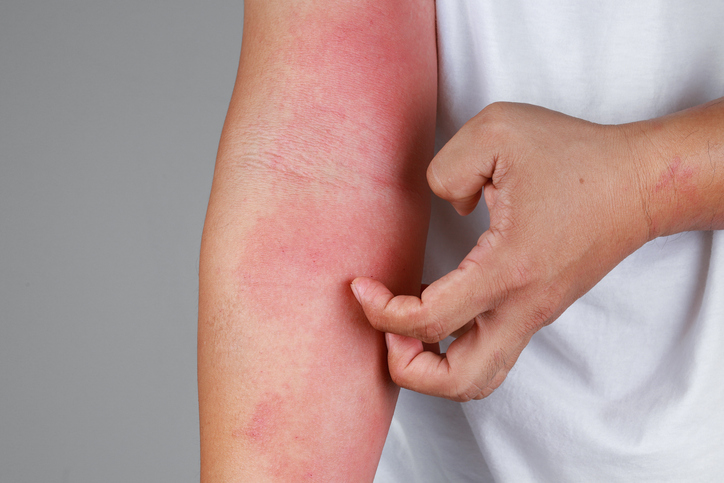Eczema Treatment in Phoenix
Desert Valley Dermatology provides high-quality dermatological care to patients seeking treatments for atopic dermatitis and other forms of eczema.
Atopic dermatitis is a skin disorder that affects millions of people worldwide. While the precise cause is not yet fully established, genetic and environmental factors are believed to contribute to the development of this condition.
At Desert Valley Dermatology, we know how debilitating eczema can be. Our dermatologists collaborate closely with each patient to develop a comprehensive atopic dermatitis treatment plan tailored to their individual needs and goals.

What is Eczema?
This condition affects people of all ages. While it can occur at any age, infants are typically more prone to the condition than adults. It is estimated that up to 20% of children experience eczema, making it one of the most common skin conditions in children.
Infants generally outgrow eczema; approximately half of the children diagnosed with eczema experience dramatic symptom reduction as they grow older. For many infants, this condition is temporary and will improve over time.
What Causes Eczema?
Eczema is not an infectious disease caused by bacteria or viruses that can be passed from person to person. The condition is primarily characterized by a genetic predisposition and impaired skin barrier function, leading to an overactive immune response.
One of the primary triggers is a genetic variation that affects the skin’s resilience. This variation in the skin’s barrier function makes it more susceptible to harmful bacteria, allergens, and toxins. As a result, the skin loses its ability to effectively ward off invaders, retain water, and protect itself from environmental pollutants and irritants.
In addition to genetic predisposition, an overabundance of the skin bacteria Staphylococcus aureus can also contribute to the development of eczema. Normally, this bacterium is found on the skin and helps maintain a natural balance. However, when there is an impaired skin barrier, it can spread more easily, causing an overactive immune response.
When the skin barrier’s function is disturbed, it triggers an immune response, leading to inflammation, redness, itching, and other uncomfortable symptoms. The immune system mistakenly perceives the skin as foreign and attacks it, resulting in what we know as eczema.
Types of Eczema
Atopic Dermatitis
Atopic dermatitis is the most prevalent form and is characterized by dry, itchy skin that often flares up in response to triggers such as allergens, irritants, or stress. It typically affects the face, arms, and legs. Shaving can sometimes trigger outbreaks of eczema on the neck. Breast eczema can cause symptoms within the nipples and under and around the breasts.
Contact Dermatitis
Contact dermatitis is the inflammatory reaction of the skin to certain substances, such as perfumes, soaps, or chemicals. Contact dermatitis typically only affects the areas where the allergen or irritant comes into direct contact with the skin.
Dyshidrotic Eczema
This is a type of eczema of the hands and feet, characterized by small, itchy blisters. The blisters can be painful and burst, leaving red, scaly patches on the skin. It is more common in women.
Nummular Eczema
Nummular eczema is characterized by round, coin-shaped patches on the skin. It often affects adults and can be triggered by dry skin, stress, or certain medications. The patches can be itchy, dry, and scaly.
Stasis Dermatitis
Stasis dermatitis is a condition that occurs in people who have poor circulation, often due to conditions like varicose veins or obesity. It is a type of eczema on the legs, ankles, and feet and is characterized by itchy, inflamed skin. Stasis dermatitis can also lead to a condition called venous eczema, which is characterized by open, weeping wounds on the skin.
The skin affected by this condition often appears dry and scaly, with a characteristic flaky texture.
What are Eczema Symptoms?
There are several common symptoms, including the following:
- Dry, itchy skin: One of the prominent symptoms is a persistent dry skin sensation. The skin becomes itchy and flaky, resulting in discomfort and irritation.
- Rash: Eczema commonly presents with a skin rash, often consisting of red or pink patches that can vary in size and severity. The rash may be flaky, scaly, or crusty in appearance.
- Bumps on your skin: Another symptom is the development of bumps or swelling on the skin. These bumps can be uncomfortable or itchy and might be filled with fluid or pus.
- Rough, leathery patches of skin: Eczema can cause the skin to become thick and leathery, especially in chronic cases. This thickening of the skin can make it difficult to treat and manage.
- Flaky or scabby skin: The skin affected by this condition often appears dry and scaly, with a characteristic flaky texture. The skin may become crusty or cracked in severe cases.
- Inflammation: In certain individuals, eczema can cause swelling or redness of the skin. This swelling can be localized to certain areas of the body or may be widespread.
What are Eczema Treatments?
A qualified medical professional must diagnose eczema. Anyone experiencing skin changes or abnormalities should seek the medical advice of a board-certified dermatologist for diagnosis and treatment.
Dermatologists rely on a combination of physical examinations, obtaining a comprehensive medical history, and additional screenings.
Because this condition cannot be cured, treatments for atopic dermatitis typically involve ongoing management strategies that reduce the severity and frequency of flare-ups.
Lifestyle Modifications
Eczema treatments involve managing personal and environmental factors that trigger outbreaks. These triggers can vary from person to person, but some common ones include the following:
- Itchy, rough fabrics
- Artificial fragrances
- Irritating chemicals found in household products like detergents or cleaners
- Tobacco smoke
- Dry air
- Cold temperatures
- Certain foods, like wheat, nut, or milk products
Avoiding or limiting exposure to these triggers can minimize the duration and number of eczema outbreaks.
Topical Medications
In addition to managing triggers, topical medications are commonly used to treat eczema. These medications aim to minimize the itching, inflammation, and discomfort associated with this condition. Common topical medications for eczema include calcineurin inhibitors and corticosteroids.
Calcineurin inhibitors, like tacrolimus ointment and pimecrolimus cream, work by managing the immune response and reducing inflammation. Corticosteroids, such as hydrocortisone cream and prednisone, reduce inflammation and suppress the body’s immune response. These medications are usually applied directly to the affected areas of the skin.
Antibiotics
In some cases, antibiotics may be prescribed to treat infected areas associated with eczema. Oral antibiotics are commonly required when the condition is severe.
Antibiotics help kill infection-causing bacteria and promote healing. It is important to follow the doctor’s instructions and complete the entire course of antibiotics to eradicate the infection.
Light Treatments for Atopic Dermatitis
Alternative approaches such as phototherapy or light therapy may be considered for patients who are not responsive to topical eczema treatments.
Phototherapy is a type of light therapy. It involves subjecting the affected areas of the skin to ultraviolet (UV) or ultraviolet B (UVB) radiation to prevent the inflammatory response. This eczema treatment can be administered in a doctor’s office or home using a specialized device. Phototherapy helps reduce inflammation and promotes healing, though multiple sessions might be required to see optimal outcomes.
Everyone’s experience with eczema is unique, and the best eczema treatment plan will depend on the severity of the condition and individual preferences.
Desert Valley Dermatology: Treatment for Eczema in Phoenix and Surrounding Communities
At Desert Valley Dermatology, we are proud to provide targeted treatment for eczema in Phoenix and neighboring areas. Our team of experts will guide you through every step of your eczema treatment, ensuring that you receive the best possible care for your specific needs.
If you are struggling with this condition, we invite you to schedule a consultation with our team at Desert Valley Dermatology today.
